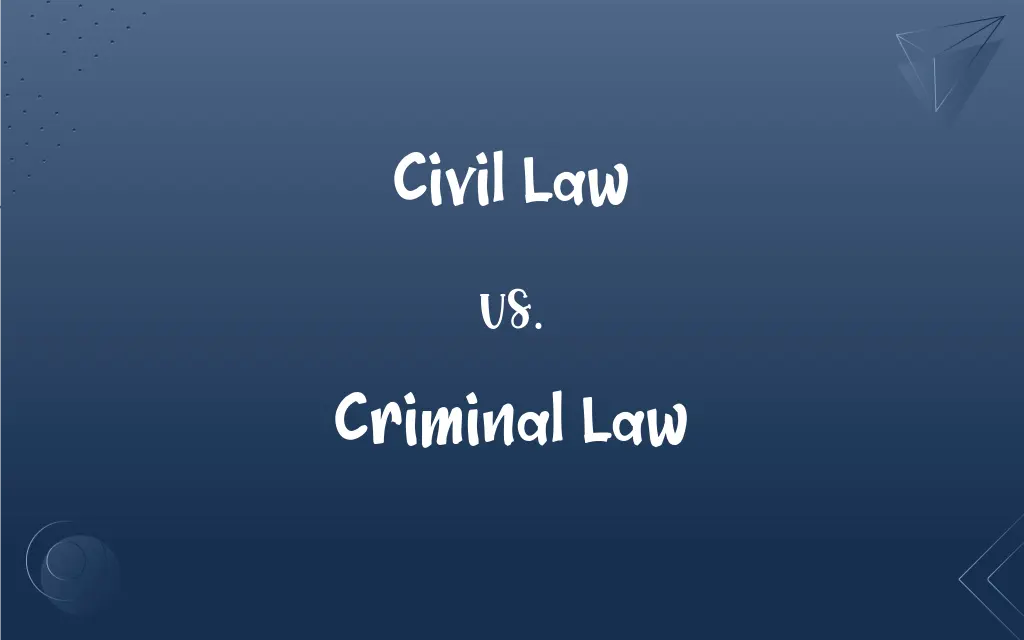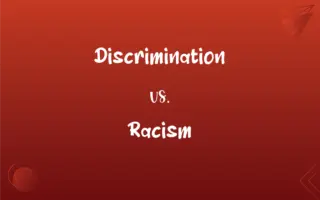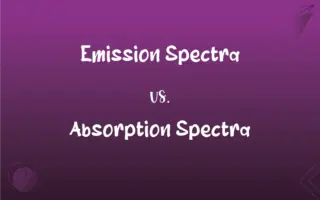Civil Law vs. Criminal Law: What's the Difference?
Edited by Aimie Carlson || By Harlon Moss || Updated on October 12, 2023
Civil law pertains to disputes between individuals or entities, whereas criminal law involves prosecution by the state for wrongful acts.

Key Differences
Civil law and criminal law serve different purposes within the legal system, providing separate frameworks for resolving disputes and administering justice, respectively. Civil law primarily addresses conflicts between private parties, whereas criminal law deals with actions that are offenses against the state or public.
Under civil law, the emphasis is placed on providing remedies and compensations for victims, typically through monetary damages. Criminal law, conversely, prioritizes punishment and deterrence, seeking to impose penalties like fines, imprisonment, or even capital punishment in severe cases.
Civil law proceedings generally involve a plaintiff seeking compensation for a wrongdoing from the defendant, without the implication of punishment. In contrast, criminal law proceedings are initiated by the government, aiming to penalize the defendant for harming society through illegal activities.
Regarding legal processes, civil law adheres to a structure involving lawsuits and possibly trials to resolve disputes. Criminal law, on the other hand, involves more stringent processes including arrest, charges, arraignments, trials, and potentially, sentencing, all under stringent procedural safeguards due to the potential loss of liberty.
Civil law usually employs a lower burden of proof, often being the "preponderance of the evidence." Criminal law, reflecting its severe consequences, demands “beyond a reasonable doubt” as its burden of proof, ensuring thorough examination and high certainty in verdicts.
ADVERTISEMENT
Comparison Chart
Primary Purpose
Resolving disputes
Prosecuting wrongful acts
Parties Involved
Private entities
Government vs. Individual
Potential Penalties
Compensation, remedies
Fines, imprisonment, capital punishment
Initiation of Proceedings
By plaintiff
By the state
Burden of Proof
Preponderance of the evidence
Beyond a reasonable doubt
ADVERTISEMENT
Civil Law and Criminal Law Definitions
Civil Law
A legal system originating in continental Europe based on written codes.
In civil law countries, the role of court decisions is secondary in shaping legal rules.
Criminal Law
Statutes related to crime, its detection, and punishment.
The attorney practiced criminal law, defending individuals accused of offenses.
Civil Law
Encompasses laws which deal with family relations.
Divorce proceedings fall under civil law, establishing legal responsibilities.
Criminal Law
Laws dealing with the punishment of offenses against societal standards.
Under criminal law, theft is punishable by fines or imprisonment.
Civil Law
A set of rules dealing with obligations, remedies, and rights between entities.
Civil law ensures individuals can seek remedies for breaches of contract.
Criminal Law
System of law dealing with the prosecution of offenses.
Criminal law seeks to uphold justice by prosecuting wrongful acts.
Civil Law
Law that relates to matters which are not criminal.
The attorney specializes in civil law, focusing on contract disputes.
Criminal Law
The body of law pertaining to crimes and offenses.
The judge specialized in criminal law, particularly in felony cases.
Civil Law
Law concerning disputes between private parties.
The civil law case was filed by the tenant against the landlord for not returning the deposit.
Criminal Law
Legal framework establishing penalties for impermissible actions.
Criminal law mandates penalties to discourage and punish illegal behavior.
FAQs
Who initiates legal action in civil law?
In civil law, the plaintiff, typically a private party, initiates legal action.
Is a breach of contract a matter for civil law?
Yes, civil law typically addresses disputes like breaches of contract.
Can criminal law lead to imprisonment?
Yes, criminal law can impose penalties, including imprisonment.
Who prosecutes cases in criminal law?
In criminal law, the government or state prosecutes cases.
Can civil law cases involve corporations?
Yes, civil law cases can involve disputes between individuals, entities, or corporations.
Does civil law deal with divorce cases?
Yes, civil law encompasses family law, including divorce.
Are the penalties in civil law punitive?
No, civil law aims for remedy and compensation, not punishment.
Does criminal law involve a jury trial?
Yes, criminal law can involve a jury trial, especially in serious cases.
Is civil law concerned with societal harm?
No, civil law focuses on resolving disputes and compensating individual harm.
Are misdemeanors governed by criminal law?
Yes, misdemeanors are less severe offenses governed by criminal law.
Is perjury a subject of criminal law?
Yes, perjury is considered an offense and is subject to criminal law.
Can civil law involve non-monetary remedies?
Yes, civil law can involve remedies like injunctions, which are non-monetary.
Can criminal law enforce societal norms?
Yes, criminal law enforces societal norms by penalizing offenses.
Can a person be liable in both civil and criminal law?
Yes, some actions may have both civil and criminal law implications.
Does civil law enforce moral standards?
No, civil law primarily deals with disputes and obligations between parties.
Is civil law focused on compensation?
Yes, civil law primarily seeks to compensate aggrieved parties.
Does criminal law address offenses against the state?
Yes, criminal law deals with acts considered offenses against the state or public.
Is theft considered a matter of criminal law?
Yes, theft is considered an offense and is dealt with under criminal law.
Can civil law result in a financial judgment?
Yes, civil law often results in financial judgments to compensate aggrieved parties.
Are felonies handled under criminal law?
Yes, felonies are serious offenses handled under criminal law.
About Author
Written by
Harlon MossHarlon is a seasoned quality moderator and accomplished content writer for Difference Wiki. An alumnus of the prestigious University of California, he earned his degree in Computer Science. Leveraging his academic background, Harlon brings a meticulous and informed perspective to his work, ensuring content accuracy and excellence.
Edited by
Aimie CarlsonAimie Carlson, holding a master's degree in English literature, is a fervent English language enthusiast. She lends her writing talents to Difference Wiki, a prominent website that specializes in comparisons, offering readers insightful analyses that both captivate and inform.































































